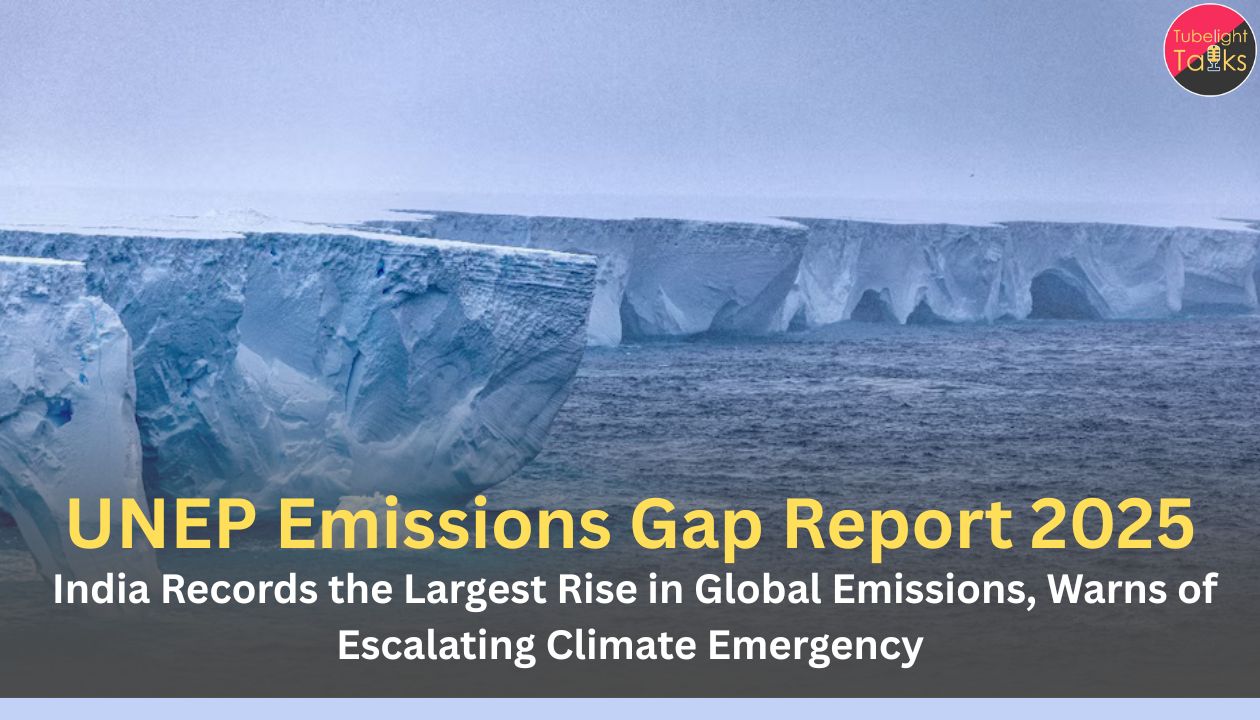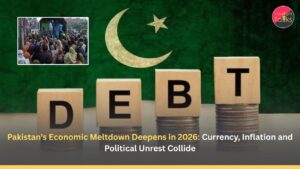UNEP Emissions Gap Report 2025: India Records the Largest Rise in Global Emissions, Warns of Escalating Climate Emergency
In a stark climate warning, the United Nations Environment Programme (UNEP) Emissions Gap Report 2025 is released, revealing that India recorded the highest absolute increase in greenhouse gas emissions globally in 2024. As the world edges dangerously closer to breaching critical climate thresholds, the report calls for “immediate and unprecedented action” to limit global warming.
📘 Official Report: UNEP Emissions Gap Report 2025
India’s Alarming Emission Spike: The Numbers
According to UNEP’s analysis:
- India experienced the largest absolute rise in emissions globally in 2024.
- The country’s emissions growth rate stood at 3.6%, second only to Indonesia.
- Despite being a developing country, India’s scale of energy use and rapid industrialisation significantly contributed to this rise.
This surge reflects both economic momentum and the challenges of managing a clean-energy transition in a country of 1.4+ billion people.
Global Climate Picture: A Bleak Outlook
UNEP’s findings are a wake-up call:
- Even if all Nationally Determined Contributions (NDCs) are met, global temperatures are still projected to rise between 2.3°C to 2.5°C this century.
- The Paris Agreement’s target of limiting warming to 1.5°C is now slipping out of reach.
- To achieve 1.5°C, emissions must be reduced by 55% by 2035, compared to 2019 levels.
“There is no time left for incremental change. What’s needed now is a climate revolution.” — UNEP Report 2025
India’s Role in the Global Climate Crisis
India’s rising emissions stem from:
- Heavy reliance on coal-based power generation
- Increased consumption in transport and urban sectors
- High energy demand from industrial growth
Yet India is also:
- One of the largest solar power markets
- Promoting schemes like PM-KUSUM, Faster Adoption of Electric Vehicles (FAME), and National Hydrogen Mission
However, UNEP stresses that current policies are insufficient to alter the warming trajectory.
Climate Action Gaps: What the World Needs Now
The 2025 UNEP report outlines five urgent global action priorities:
- Accelerate Clean Energy Adoption
- Shift from fossil fuels to solar, wind, and green hydrogen.
- Shift from fossil fuels to solar, wind, and green hydrogen.
- Cut Methane Emissions
- Agriculture, energy and waste sectors must reduce methane sharply.
- Agriculture, energy and waste sectors must reduce methane sharply.
- Reform Carbon Markets
- Carbon pricing must reflect true climate costs.
- Carbon pricing must reflect true climate costs.
- Invest in Climate Finance
- Developed nations must fulfil $100 billion/year pledge to developing countries.
- Developed nations must fulfil $100 billion/year pledge to developing countries.
- Phase Down Coal Rapidly
- Coal is the single largest contributor to CO₂ rise — urgent phase-down needed.
- Coal is the single largest contributor to CO₂ rise — urgent phase-down needed.
India’s Emission Responsibility vs Development Needs
The Dilemma
India faces a climate-development paradox:
- Per capita emissions remain lower than developed countries.
- But its absolute contribution is now substantial due to population and industrial activity.
Experts suggest:
- India must balance growth with green transition
- Prioritise renewables, energy efficiency, and carbon-neutral infrastructure
“It’s no longer a choice between growth and climate action — they must go hand in hand,” says the UNEP report.
Technology Exists — But So Do Barriers
UNEP states that:
- Low-carbon technologies like solar, wind, electric mobility, and storage are available and increasingly affordable.
- But implementation lags due to:
- Lack of finance
- Policy uncertainty
- Poor international collaboration
- Lack of finance
India needs:
- Stable green finance mechanisms
- Public-private climate partnerships
- Stronger climate-resilient urban planning
A Spiritual Perspective: Earth Is Sacred
Nature Is Not a Resource — It’s Divine Creation
Sant Rampal Ji Maharaj offers a profound spiritual understanding of nature’s role in human life. He teaches that:
“The Earth, sky, air, water, and fire are gifts of God. Exploiting them for greed distances humanity from divinity.”
According to Satbhakti (true devotion):
- Living harmoniously with nature is part of spiritual duty
- Pollution, deforestation, and overconsumption are signs of spiritual ignorance
- True disciples adopt simple, sustainable lifestyles, conserving nature and focusing on soul liberation
Sant Rampal Ji Maharaj urges humanity to:
- Shift from material obsession to moral and spiritual awakening
- Embrace Naam Diksha (initiation) and abandon harmful practices
- Lead by example — reduce carbon footprint and promote kindness to all creation
🌐 Learn more: JagatGuruRampalJi.org | YouTube
Call to Action: Transform, Don’t Just Transition
Climate Revolution Starts with You
The UNEP Emissions Gap Report 2025 is not just a document — it’s a red siren for nations, industries, and individuals.
India has the opportunity to:
- Lead the world in climate justice
- Innovate in green manufacturing
- Build a sustainable, inclusive economy
Let us:
- Reduce electricity and fuel use
- Plant more trees
- Support clean tech initiatives
- Practice spiritual discipline to stay humble and eco-conscious
Read Also: Nearly 90 % of Satellite‑Detected Methane Leaks Are Ignored — UN Sounds Alarm
FAQs: India’s Emissions and UNEP 2025 Report
1. What did the UNEP Emissions Gap Report 2025 say about India?
India had the highest absolute increase in emissions in 2024. Its growth rate was 3.6%, the second-fastest globally.
2. What is the current global warming projection?
If current pledges are met, the world is on track for 2.3°C to 2.5°C warming — well above the Paris target.
3. Why are India’s emissions rising so fast?
Due to high dependence on coal, rising industrial energy demand, and expanding urban transport and consumption.
4. Is India doing anything about it?
Yes, India is expanding renewables, promoting EVs, and supporting green industry — but current action is not enough.
5. What does Sant Rampal Ji Maharaj say about climate?
He teaches that nature is sacred, and polluting it is a sin. True devotees must live sustainably, ethically, and spiritually.
6. Where can I read the full UNEP report?
You can access it here.











Discussion (0)